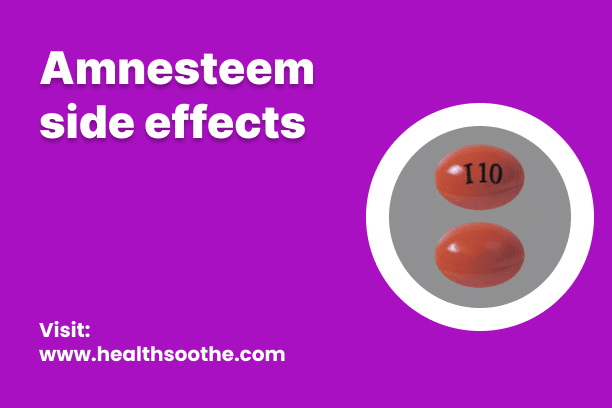Amnesteem is prescribed for the treatment of severe cystic acne, also recognized as nodular acne, which has not shown improvement with other treatments such as benzoyl peroxide or clindamycin applied topically, or tetracycline or minocycline taken orally. It falls into the category of medications called retinoids. Its mechanism involves reducing the production of facial oil, known as sebum. Excessive sebum production can result in severe acne. Untreated severe acne may lead to permanent scarring.
How to use Amnesteem
Before beginning to use isotretinoin, carefully review the Medication Guide provided by your pharmacist each time you refill your prescription. Prior to initiating this medication, it is essential to read and sign a Patient Information/Informed Consent form. If you have any inquiries regarding isotretinoin, seek guidance from your doctor or pharmacist before starting the medication.
Follow your doctor’s instructions and take this medication orally, usually twice daily for a duration of 15 to 20 weeks. Swallow the capsules whole; do not crush or chew them. Depending on the brand, some recommend taking the medication with meals, while others suggest it can be taken with or without food. Food aids in the absorption of the drug into your bloodstream. For further details, consult your doctor or pharmacist.
Take this medication with a full glass of water (8 ounces/240 milliliters) unless otherwise directed by your doctor. Refrain from lying down for at least 10 minutes after taking this medication.
The prescribed dosage is contingent upon your medical condition, weight, and response to treatment.
Initial use of this drug may lead to a temporary worsening of acne within the first few days, and it might take 1-2 months before you observe the full benefits of the medication. In the event of severe acne recurrence, a second treatment course may be initiated after a 2-month interval from discontinuation of the drug. Prolonged usage of isotretinoin is not recommended by the manufacturer. Adhere strictly to the recommended dosage; do not exceed it.
As isotretinoin can be absorbed through the skin and lungs and may pose a risk to unborn babies, pregnant women or those planning to conceive should refrain from handling this medication or inhaling dust from the capsules.
Read Also: Strategies for Preventing Prescription Drug Abuse
Side Effects
Common side effects of this medication may include dry lips and mouth, minor swelling of the eyelids or lips, crusty skin, nosebleeds, upset stomach, or thinning of hair. Should any of these effects persist or worsen, promptly inform your doctor or pharmacist.
To alleviate dry mouth, consider sucking on sugarless hard candy or ice chips, chewing sugarless gum, drinking water, or using a saliva substitute.
It’s important to remember that your doctor has prescribed this medication because they have determined that the benefit to you outweighs the risk of side effects. Many individuals using this medication do not experience serious side effects.
Notify your doctor immediately if you experience any serious side effects, including changes in mental/mood such as depression, anxiety, or thoughts of suicide, tingling sensation in the skin, back/joint/muscle pain, signs of infection like a persistent sore throat or fever, painful swallowing, or peeling skin on the palms/soles.
Isotretinoin may rarely lead to pancreatitis, a condition that can be fatal. Cease taking this medication and inform your doctor immediately if you experience severe stomach pain, severe or persistent nausea/vomiting.
Discontinue the medication and inform your doctor right away if you encounter any very serious side effects, including severe headache, changes in vision, ringing in the ears, hearing loss, chest pain, yellowing of the eyes/skin, dark urine, severe diarrhea, or rectal bleeding.
Although rare, a severe allergic reaction to this drug may occur. Seek immediate medical assistance if you observe any symptoms of a serious allergic reaction, including rash, itching/swelling (especially of the face/tongue/throat), severe dizziness, or difficulty breathing.
Pros and Cons of amnesteem
Pros:
- Highly Effective
- Long-Term Results
- Reduces Scarring
Cons:
- Side Effects
- Pregnancy Risks
- Monitoring Requirements
Differences Between amnesteem and cymbalta
Amnesteem (Isotretinoin):
Amnesteem is primarily used to treat severe acne, particularly cystic and nodular acne, that has not responded well to other treatments. It belongs to the retinoid class of medications.
Cymbalta (Duloxetine):
Cymbalta is used to treat major depressive disorder, generalized anxiety disorder, neuropathic pain associated with diabetic peripheral neuropathy, fibromyalgia, and chronic musculoskeletal pain. It belongs to the class of medications known as serotonin-norepinephrine reuptake inhibitors (SNRIs).
Alternative to amnesteem
Tetracycline antibiotics:
Drugs like doxycycline and minocycline are commonly used to treat acne by reducing inflammation and bacterial growth.
Warnings
Isotretinoin is strictly contraindicated for use in pregnant women due to the potential for serious, and sometimes fatal, birth defects, miscarriages, and premature births when the drug is used during pregnancy. Women must take precautions to avoid pregnancy while undergoing treatment with isotretinoin.
Female patients are required to utilize two effective forms of birth control (or abstain from sexual intercourse) for 1 month before starting isotretinoin, throughout the duration of treatment, and for 1 month after discontinuation of the medication. Additionally, monthly pregnancy-avoidance counseling from a healthcare provider is mandatory. It is advised not to rely on “minipills” (non-estrogen-containing pills) for birth control as they may not be as effective when used with isotretinoin. In the event of a missed period or unprotected sexual intercourse while on isotretinoin, discontinue the medication immediately and contact your doctor without delay.
In the United States, obtaining isotretinoin requires compliance with the requirements outlined in the iPLEDGE Risk Evaluation and Mitigation Strategy (REMS) Program. Residents of other countries, including Canada, should consult their healthcare provider and pharmacist to understand the regulations applicable in their respective regions.
It’s crucial to discuss with your doctor the potential risks and benefits associated with the use of isotretinoin.
Precautions
Before initiating isotretinoin treatment, inform your doctor or pharmacist if you have any allergies, especially to isotretinoin, vitamin A-related drugs (such as tretinoin), or any other substances present in the medication. This product may contain inactive ingredients that could trigger allergic reactions or other complications. Individuals allergic to peanuts may also have sensitivities to soy, a common inactive ingredient in this medication. Consult your pharmacist for further information.
Prior to using isotretinoin, disclose your medical history to your doctor or pharmacist, particularly if you have diabetes, a family or personal history of elevated blood fats (triglycerides), mental health issues (like depression), liver ailments, obesity, eating disorders (such as anorexia nervosa), alcohol misuse, pancreatitis, or conditions associated with bone loss (such as osteoporosis/osteomalacia, reduced bone density).
Do not donate blood while taking isotretinoin and for at least one month after discontinuing the medication.
Isotretinoin may heighten your sensitivity to sunlight. Limit your exposure to the sun, avoid tanning beds and sunlamps, and use sunscreen and protective clothing when outdoors. Notify your doctor promptly if you experience sunburn or skin irritation.
Isotretinoin can affect night vision. Refrain from driving, operating machinery, or engaging in activities requiring clear vision after dark until you are confident in your ability to perform these tasks safely.
If you wear contact lenses, you may experience decreased tolerance while using this medication. Contact your doctor for guidance.
Refrain from undergoing cosmetic procedures to smoothen your skin (such as waxing, laser treatments, or dermabrasion) during isotretinoin therapy and for six months following its completion, as it may lead to skin scarring.
Avoid alcohol consumption while taking isotretinoin as it may heighten the risk of certain side effects, such as pancreatitis.
There is limited evidence suggesting isotretinoin may cause bone loss effects and impede normal growth in some children (epiphyseal plate closure). Consult your doctor for more information, especially if you or your child are involved in contact or high-impact sports like football, basketball, soccer, or tennis.
Older adults may be more susceptible to the side effects of this medication, particularly those affecting bones.
Children may also be more sensitive to certain side effects, especially back/joint/muscle pain.
Isotretinoin must not be used during pregnancy or by those who may become pregnant during treatment. If you suspect you are pregnant, inform your doctor immediately. Given that isotretinoin can be absorbed through the skin and lungs and may harm an unborn baby, pregnant women or those planning pregnancy should avoid handling this medication or inhaling dust from its capsules.
Before starting isotretinoin, two negative pregnancy tests are required. Additionally, monthly pregnancy tests are mandatory during isotretinoin treatment. If a pregnancy test is positive, discontinue the medication and consult your doctor immediately.
It is uncertain whether isotretinoin passes into breast milk; however, similar drugs do. Breastfeeding is not recommended while using this medication. Consult your doctor regarding breastfeeding after discontinuing treatment.





